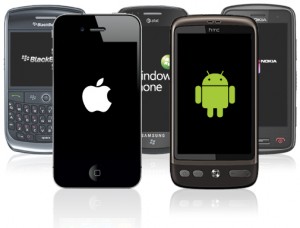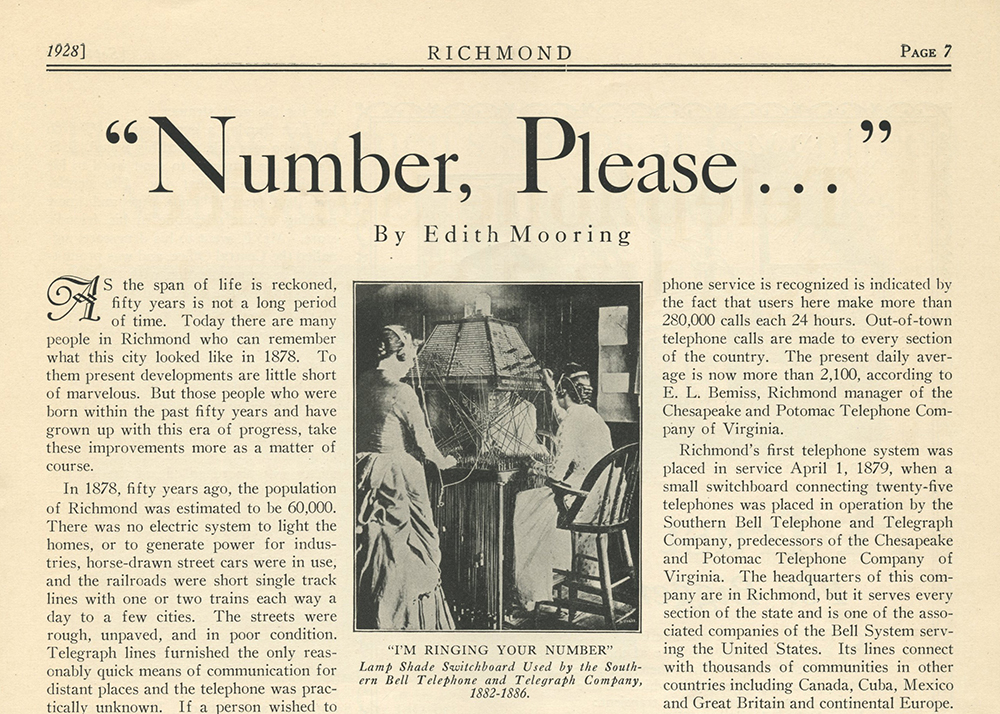
In the course of doing some research into Richmond history, I discovered yet another interesting story at the intersection of ministry and technology. This article from Richmond Magazine, a Chamber of Commerce publication, marvels at how the telephone and the system of connectivity empowering it has changed the city in the fifty years since the introduction of telephones in 1879.
If you’re not familiar with the history of telephones, you may be surprised to know that, prior to the invention of the telephone switchboard (the telephone exchange), pairs of telephones were connected almost like an intercom. It was the invention of the exchange, and its associated service to which you could subscribe, that allowed people to be part of a network. The number of exchanges and subscribers grew, and by 1958 demand for service was so great that telephone numbers with exchange names (LAkewood-2697) were replaced by area codes and all-number calling. People complained that all-digit phone numbers were dehumanizing, but with this change the idea that you could “reach out and touch someone”–lots of someones–became a reality.
With that brief historical context, the Richmond Magazine article becomes even more interesting. Noting that Richmond telephone users always recognized the value of the service, this 1928 article looks back to stories of wonder from the “early days” described in the 1879 Richmond Telephonic Exchange directory. It’s fascinating to me how people’s names are given as testimony to the fact that people you know in your community are part of this revolution. There are anecdotes about how the telephone is helping people as they travel, when they are ill, and, in this case, when they cannot attend church.
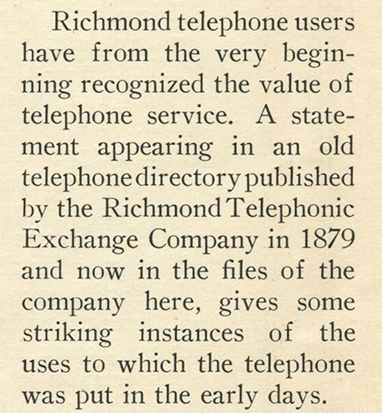
The article carefully describes the technology employed, including the Blake Transmitter–a more sensitive microphone invented just two years before–and the Bell Hand Telephone. The set-up may have looked something like this. The minister, Rev. Dr. Churchill Jones Gibson, was founder of Grace Church and its rector for fifty years.
The telephone company account is both charming and dramatic. The Sunday School children sing; the church bell rings; the call to worship is spoken; the woman with prayer book, Bible, and hymnal utters the responses; and at the end, the astonished congregation learns that the absent parishioner has indeed been able to join them in worship. In 1879, it must have seemed like a miracle has taken place.
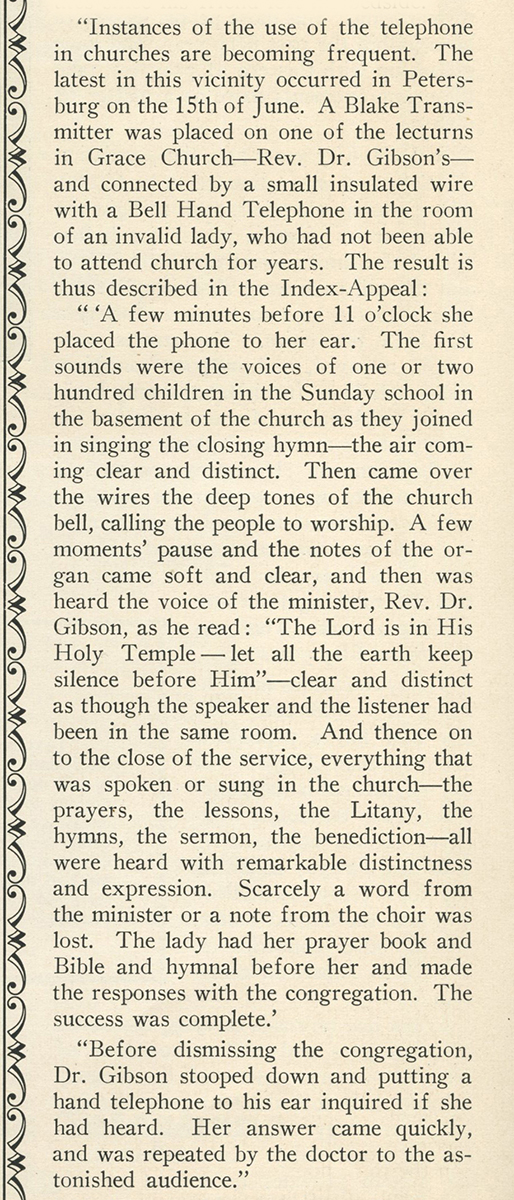
As I think about this story and some of its carefully noted details, I wonder about the impetus for this extraordinary effort. What gave the Rev. Dr. Gibson the idea to use new technology in this innovative way?
Given my years in the Church, I feel certain the “invalid lady who had not been able to attend church in years” must have been an esteemed and beloved member of the congregation. Someone of importance to Grace Church. The date of the service, June 15, would have been the 15-year anniversary of the Second Battle of Petersburg, a Confederate victory. The Second Battle of Petersburg (which took place just days after the Battle of Old Men and Young Boys) also began the more than nine-month long Siege of Petersburg which temporarily halted construction on Grace Church and forced the congregation to worship in the basement.
It seems safe to suggest that Sunday, June 15, 1879 was a special occasion in the life of the congregation, perhaps related to the city’s annual remembrance of these battles, and that bringing this homebound woman into the event was an important part of the commemoration. Perhaps she was a Confederate widow, or a particularly active parishioner in years past. I wish we knew her name.
A history of St. Paul’s Episcopal Church in Petersburg notes that many Confederate generals worshiped at these two Episcopal churches. “Saint Paul’s sanctuary was more striking, but most officers were of the opinion that Reverend Churchill J. Gibson of Grace Episcopal, the former missionary, was the better preacher.”
Perhaps this sort of event contributed to Gibson’s reputation as a preacher, and his long tenure at Grace Church. He certainly seemed to grasp the power of using technology to bring people together and create excitement.
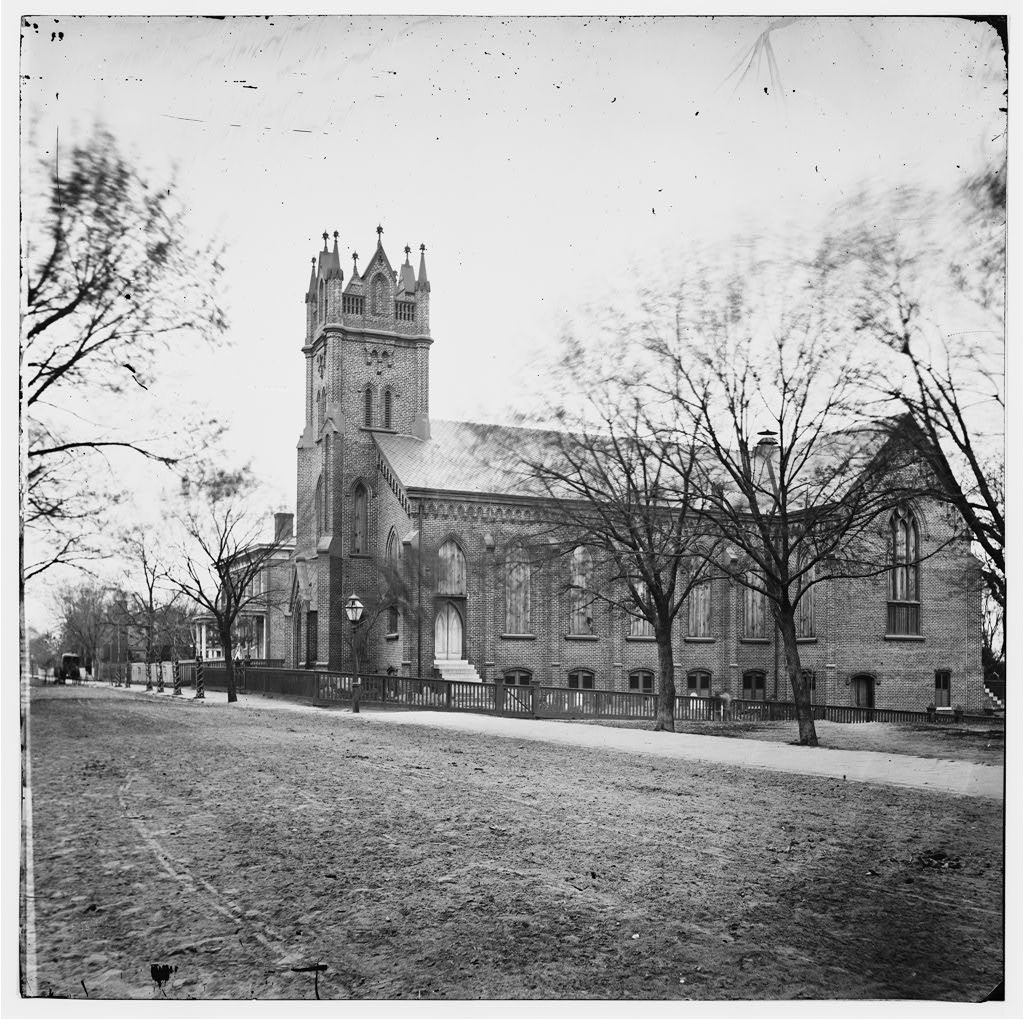
Grace Episcopal Church, Petersburg, Va.
Image: Library of Congress, Public Domain
I uncovered this Chamber of Commerce story more than a year ago, so it’s had some time to percolate. It first pulled me in as an example of the Church’s use of cutting-edge technology to foster community and extend its ministry. Having lived through the days of radio and television preachers, live streaming services on Facebook, prayer group apps for your phone, and debates over the validity of sharing communion online, I enjoy a reminder that the church has always been excited by new tools for mission.
But at the same time, I’m sobered to consider that this marvelous event occurred when the Civil War was so recently past. A congregation is a complex organism at any time, but to imagine those people, and all the emotions they must have carried into worship that June of 1879…. What would it have been like to minister to them, I wonder? Holding them together. Lifting them up. Remembering the past while grasping the future.


